The best souvenirs from Greece include food, drink, decorations, instruments, games, clothing items and lots more! Here’s everything you need to know about the best things to buy in Greece. Written by a local.

The best Greek souvenirs
People who travel to Greece often ask what are the best Greek souvenirs. Visitors look for unique gifts from Greece to take back home for their friends, or as a memory from their trip.
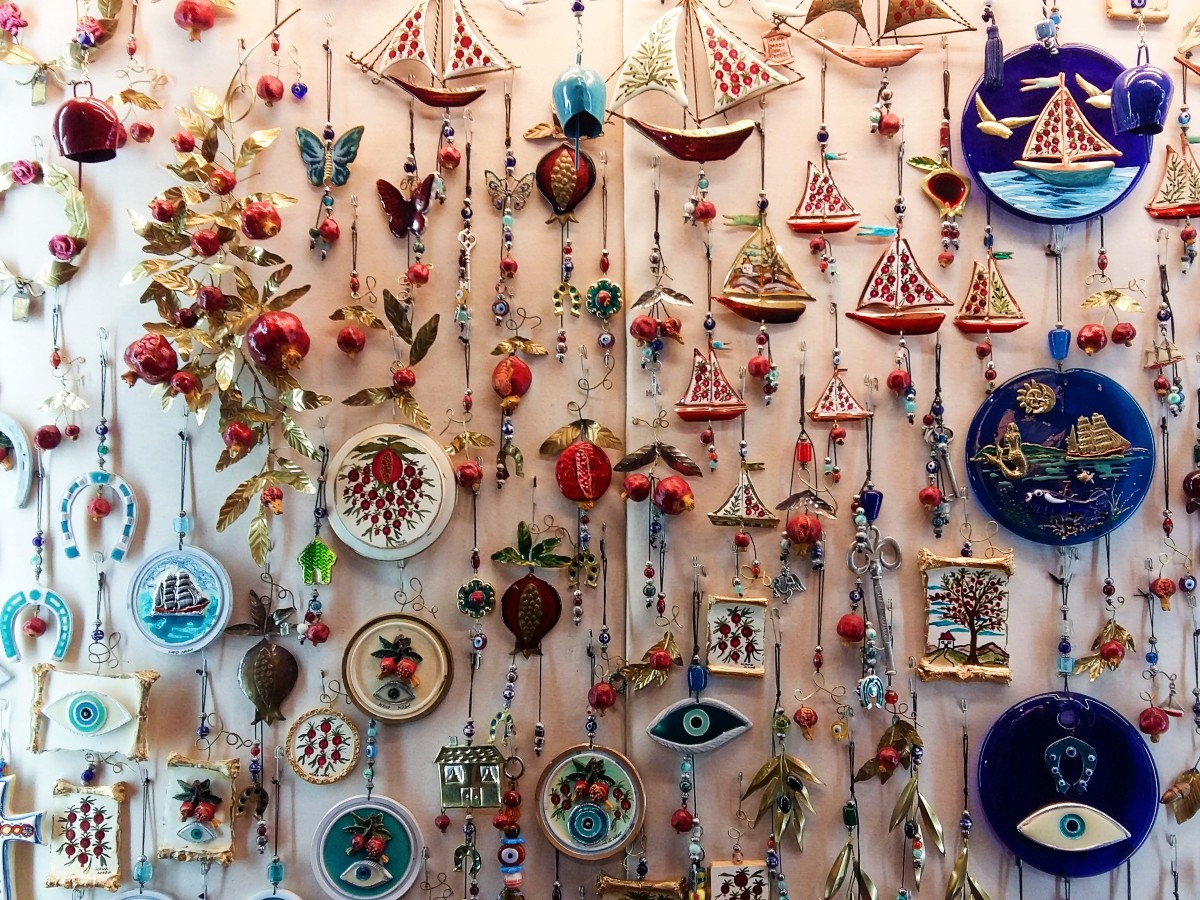
I am Vanessa from Athens. In this article, I have listed 26 items that capture the essence of Greece. I’ve taken most of these items to friends abroad, and was greeted with big smiles!
I’ve included fantastic food gifts, memorable objects and even a couple of quirky souvenirs from Greece, just for fun. Enjoy!
1. Feta cheese
Feta is the most best known cheese of Greece. Its soft, crumbly texture and its unique taste make it very popular for Greeks and visitors alike.

If your country’s regulations allow it, I totally suggest bringing back a packet of real Greek feta. Yes, it’s possible that you can get some type of feta in your country, but it just won’t be the same!
Feta is available in every single supermarket in Greece. You can also get sealed packets at the airport, on your way home.
2. Greek honey
Honey is considered to be one of the best superfoods. It’s been used for thousands of years not only as a food, but also in traditional medicine, due to its antibacterial and anti-inflammatory properties.
Greece produces several types of honey. A few examples are thyme honey, Greek pine / fir oney, wild oak honey, chestnut honey, arbutus honey and heather honey.

In Athens, you can find good quality honey at delis, street markets, and the Varvakios food market. Moreover, you will easily be able to find local honey in every single Greek island.
Just make sure you are allowed to take it back home. As an example, you can’t bring honey to Australia.
3. Olives and olive oil
Olives and olive oil have been a huge part of Greek culture and Greek tradition since the ancient years.
You may have heard the story about goddess Athena who offered an olive tree to the city of Athens, and became the city’s patron goddess. If not, here’s how Athens took its name.
Olive oil is widely used in Greek cooking, and is liberally added in salads and dips.
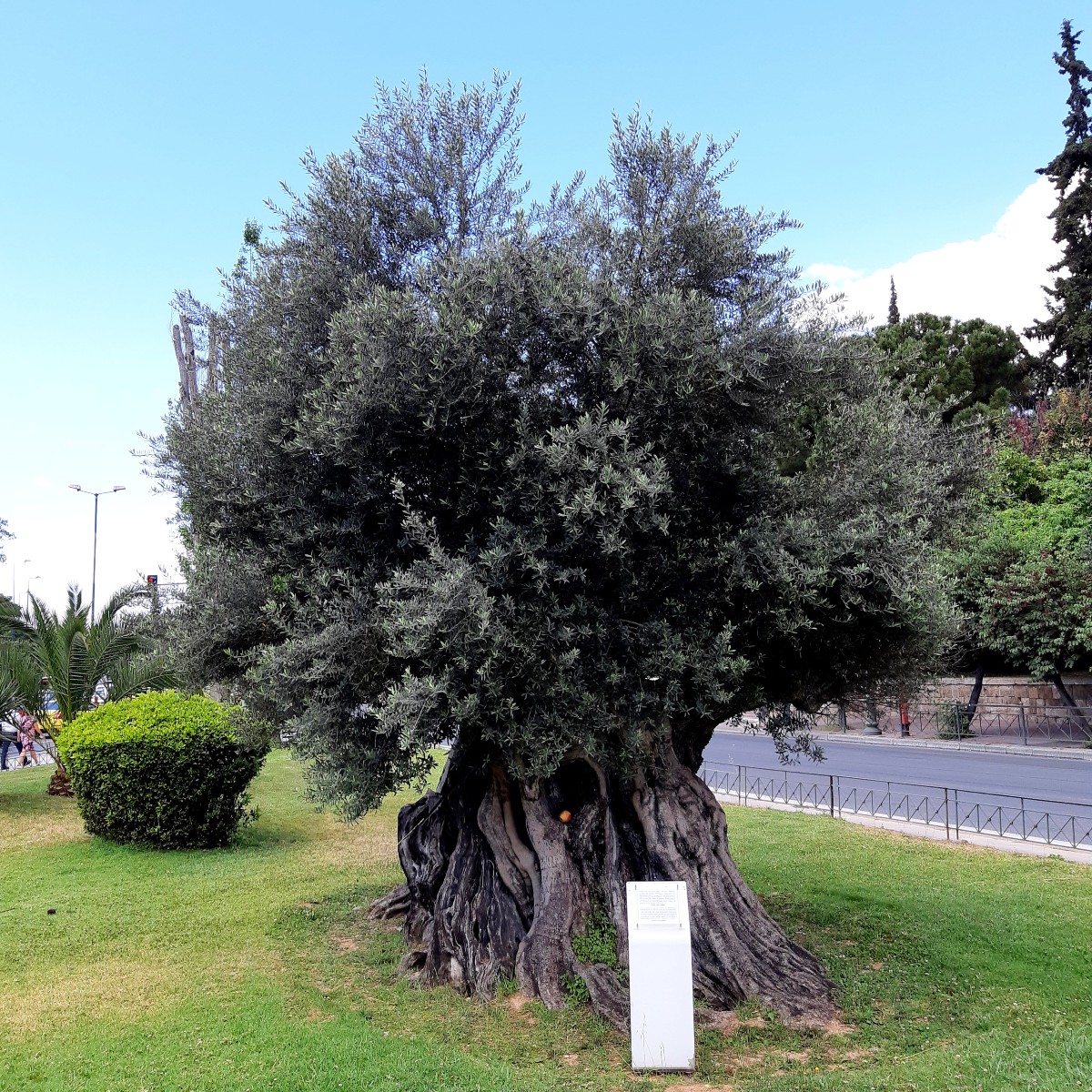
Extra virgin olive oil is a very important ingredient in the famous Mediterranean diet. It is rich in antioxidants, and is linked to a lower incidence of cardiovascular disease. Have a look at this recent piece of medical research.
Olive oil is produced from olives, which grow on olive trees. The olives are picked from the trees and then crushed, resulting in the precious oil.
Olives can also be eaten, however pay attention – you can’t eat them straight from the tree, as they are very bitter! They are first cured in brine for a few weeks, and they are then ready to eat. The best known variation are the black Kalamata olives.

You can easily find Greek olive oil and all sorts of green and black olives in food markets and supermarkets all around Greece. Also, check out for olive paste, a tasty spread made out of olives.
4. Raisins, sultanas and currants
Another popular Greek superfood are raisins, sultanas and currants. Sold in Greece under one name, “stafides“, those tiny dried grapes are rich in antioxidants, fibre, iron and potassium.
It’s easy to find stafides everywhere, including open-air markets, supermarkets, the central market and small shops.
5. Greek coffee
Coffee is a very popular beverage in Greece, and a huge part of the Greek lifestyle.
While cold and iced coffee are very common, especially in summer, there is another type that you need to taste: Greek coffee. It is very typical in Greece, Turkey and a few other nearby countries.
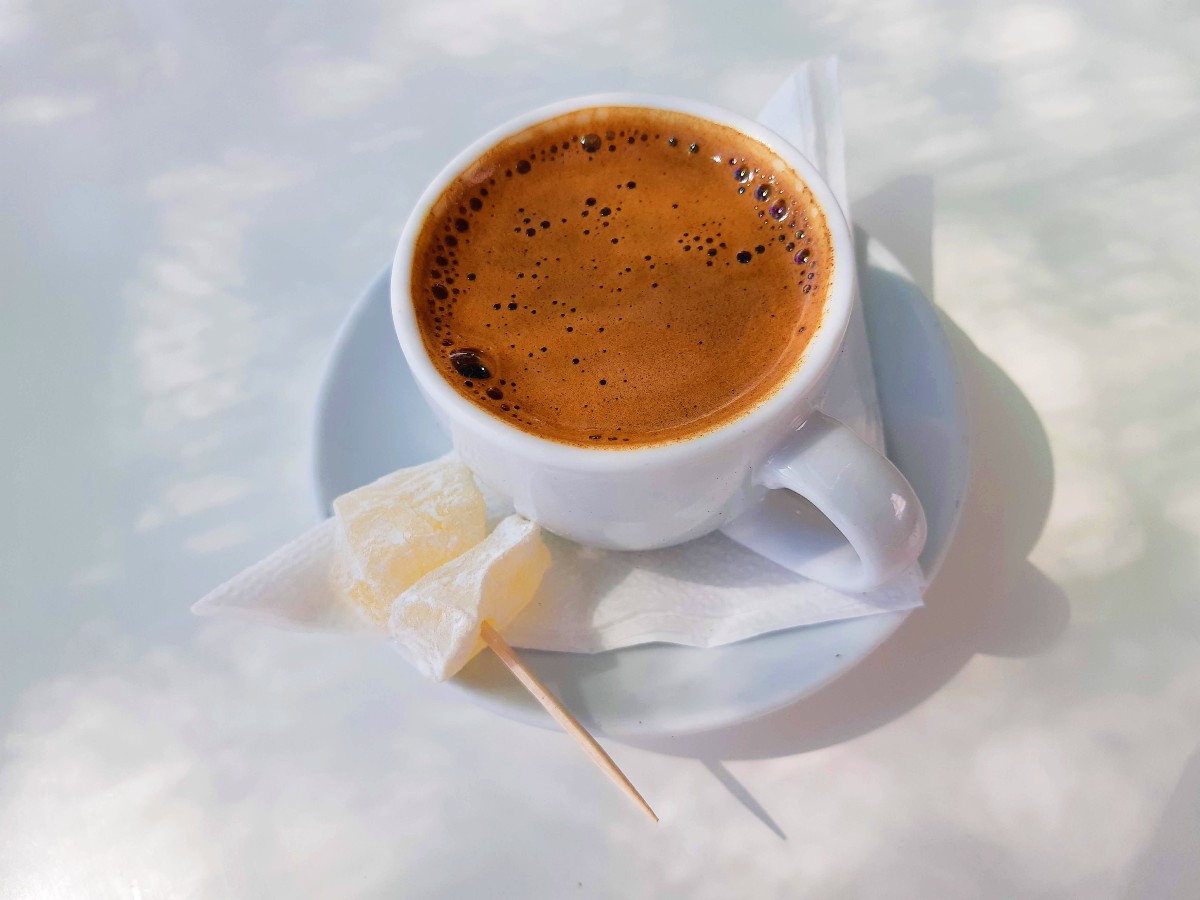
The ground coffee beans are boiled with water in a special pot, called briki. The drink is then poured into a small cup. You need to be careful not to drink the thick sediment at the bottom of the cup 🙂
Bags of Greek coffee along with demitasse cup sets are among the best souvenirs from Greece.
Side note: If you are going to both Greece and Turkey, I would suggest that you get your coffee and cups in Turkey. Note that, while the coffee is called “Greek coffee” in Greece, it’s obviously called “Turkish coffee” in Turkey.
Here’s some more information on coffee in Greece and the Greek coffee culture.
6. Greek ouzo and raki
Ask anyone who has been to Greece, and they are likely to remember one drink: Ouzo. A bottle of the iconic anise flavoured aperitif is one of the best gifts from Greece.
Another popular alcoholic beverage in Greece is raki, or tsipouro, which is somewhat similar to Italian grappa. It has a high alcohol content, and can also be simmered with honey and cinammon to produce a warm drink, rakomelo.
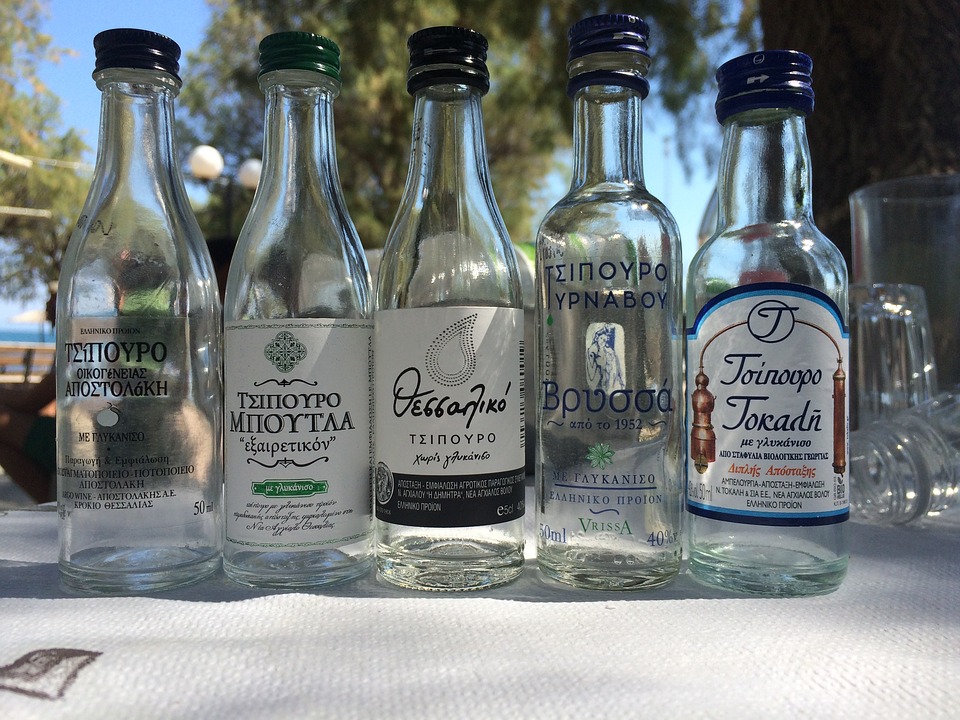
You can easily get Ouzo and raki everywhere, including airports. I recommend an Ouzo brand called Plomari, produced in a family owned distillery.
Here is some more information on Greek drinks.
7. Mastiha products
Another Greek superfood is mastiha. People have been using it for medicinal purposes since the times of Ancient Greece. It’s a natural way to treat digestive issues and other conditions of the gastrointestinal system.
Mastiha is a natural resinous substance with a distinctive flavour, somehow similar to vanilla. It is collected from the mastiha shrubs, which grow exclusively in Chios island. You can see what they look like in this video.
The most common products containing this precious ingredient are mastiha chewing gums and mastiha liqueur. You can also find mastiha-flavoured coffee, chocolate, halva, and many more treats.
Among all Greek souvenirs, this is one of the most unique ones. You can find mastiha products in dedicated shops, including a signature store at the Athens International Airport.
8. Greek herbs and mountain tea
Hundreds of different herbs grow in Greece. Even on the driest of islands, like the Cyclades, you can see several types of shrubs and bushes.
Thyme, oregano and rosemary are among the most common herbs in Greece. Most of them are collected, dried, and are then ready to be used in the preparation of Greek food.
Apart from the herbs, you can find several types of herbal teas, like linden, sage, chamomile or verbena. These are available either in the form of loose leaves, or in sachets.
The most popular Greek tea is what we call “tsai tou vounou“, which translates to “mountain tea”. The actual plant is called Sideritis (ironwort). You will easily find bags including the stems, leaves and flowers of the plant.
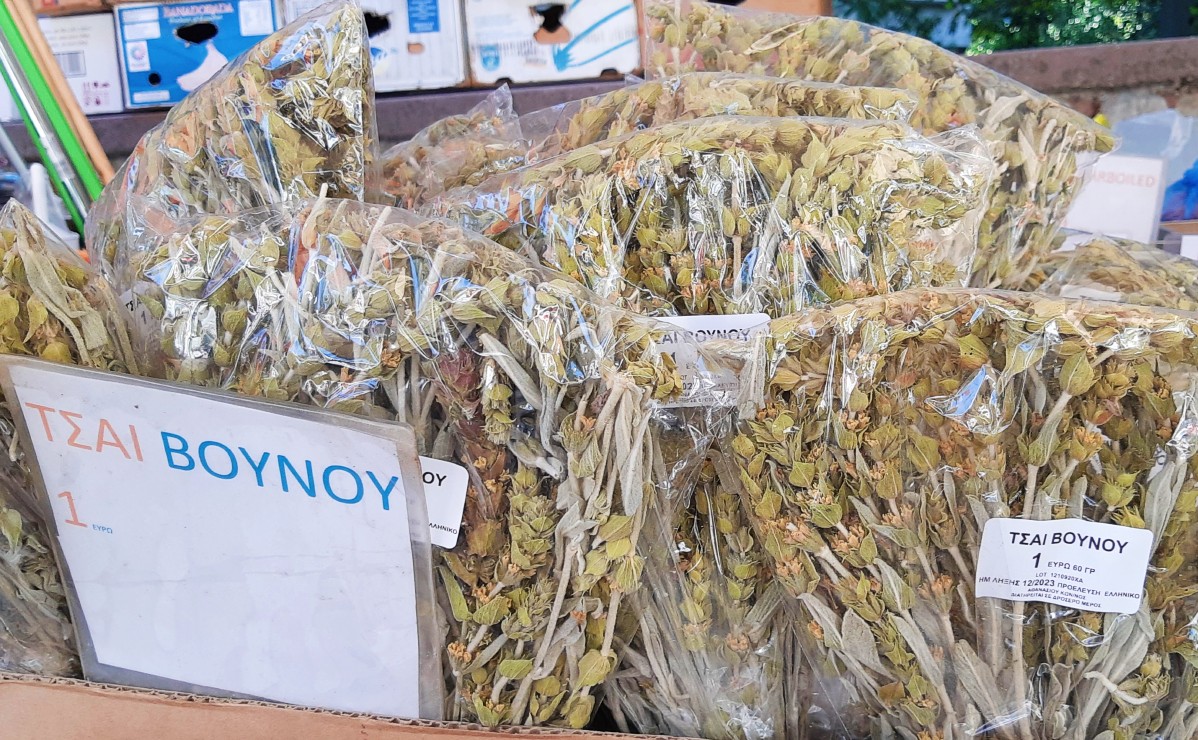
For a special treat, look out for krokos, or saffron, from the area of Kozani.
My favourite place to get herbs and herbal teas is the Varvakios food market. I warmly recommend a store called 1,001 Gefsis, on Athinas street.
9. Greek sweets and sweet treats
Any of your friends with a sweet tooth will definitely appreciate a box of Greek sweets.
Some of the best known desserts you can take nack home include baklava and halva. Baklava is made out of filo pastry, nuts and a thick syrup, while the main ingredients in halva are tahini and sugar.
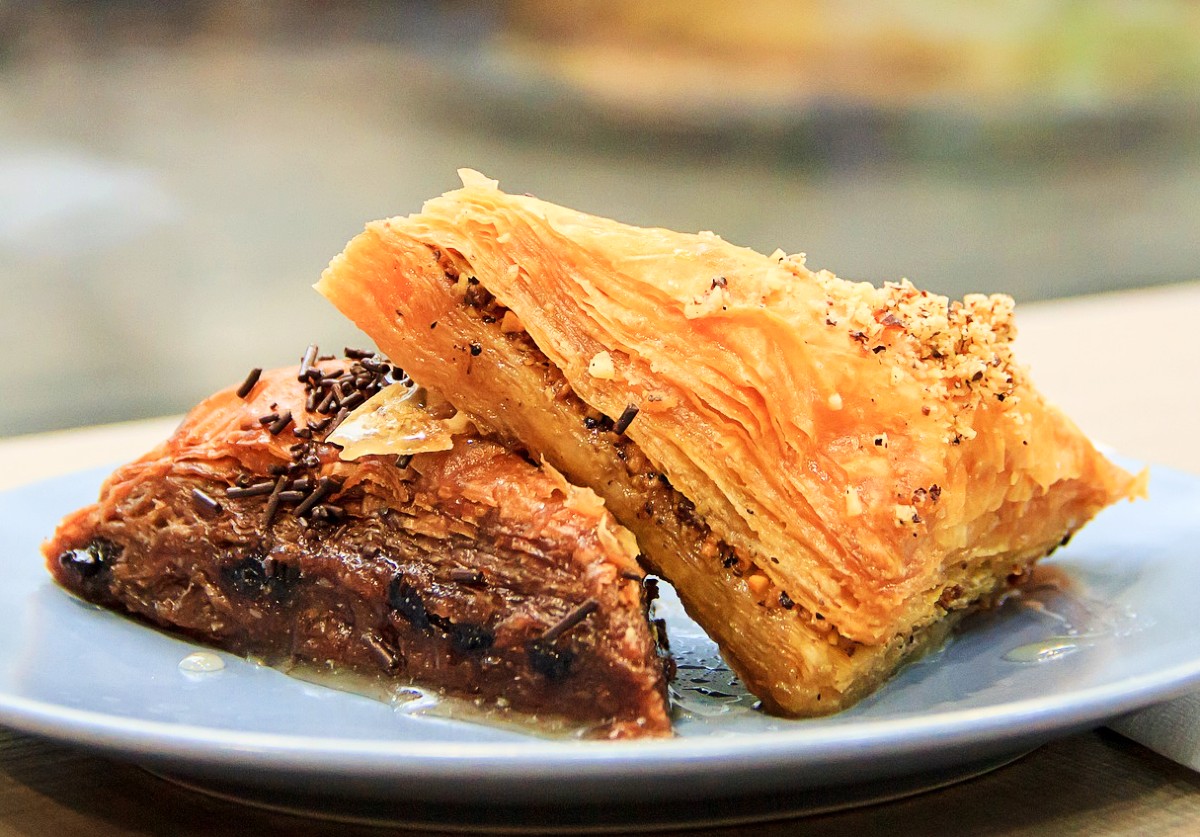
Another popular snack is pasteli, made out of sesame seeds and honey or sugar. There is a crunchy and a soft version, and they are often seasoned with cinnamon, cloves or even mastiha.
Spoon sweets, or glyko tou koutaliou, are also fairly popular. They are produced after boiling pieces of fruit in a thick, sugary syrup and sold in jars.
Apart from these, you can buy cakes, cookies and many other sweet treats at most bakeries in Greece. Here is a long list of the best Greek desserts!
If you are spending Christmas in Greece, look out for kourambiedes and melomakarona, some very special cookies that you won’t find at other times of the year.
Tip: If you have a sweet tooth, it’s worth spending a few days in Thessaloniki, where you’ll find some excellent patisseries and some of the best pastries in Greece!
10. Handmade leather sandals
Leather sandals are among the best Greek souvenirs. They are flat, light sandals made out of leather and a rubber sole. They come in various designs and colors, though they are more common in light brown.
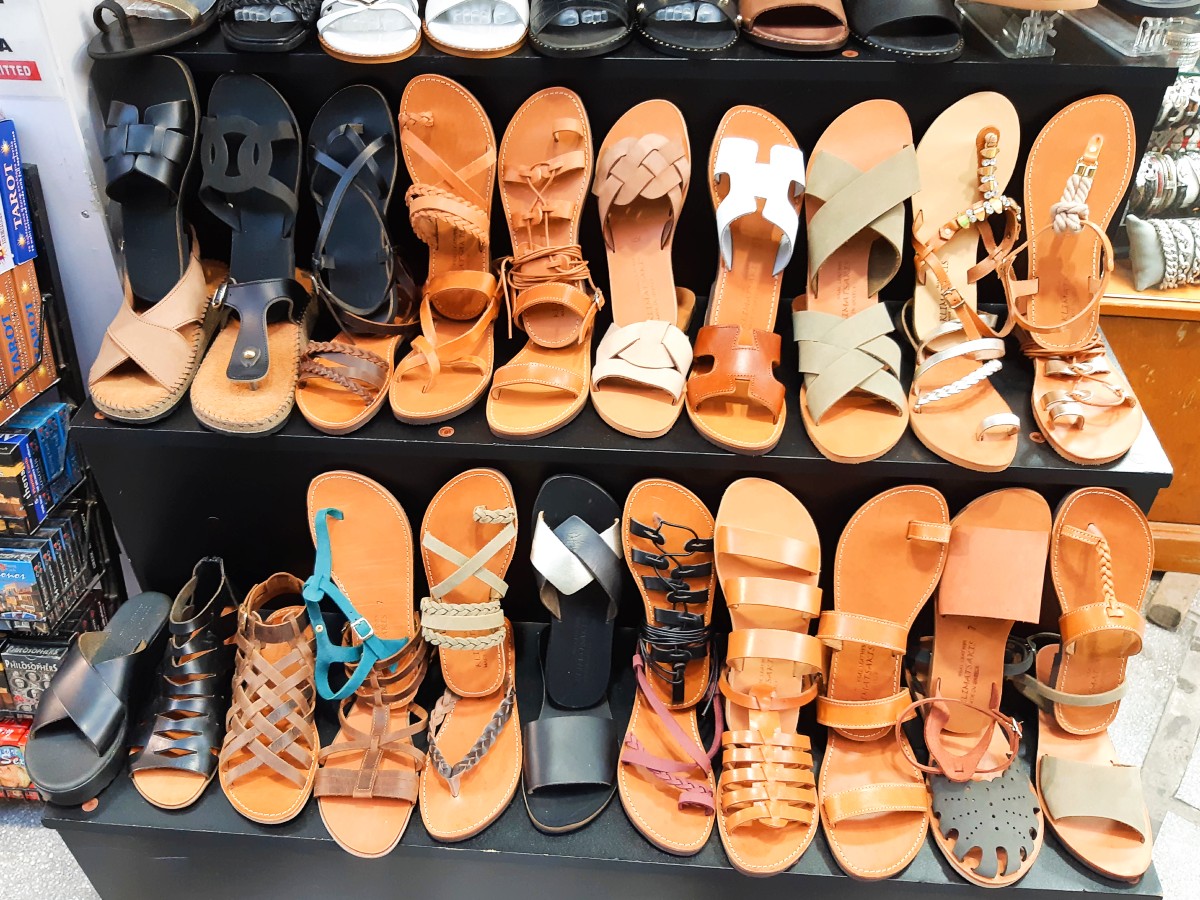
Watch any movie inspired by ancient Greek mythology, and you will notice that ancient Greeks wore similar sandals. (In reality, more types of shoes existed back then, just like today’s closed shoes or boots).
You can easily find Greek leather sandals in souvenir shops in Plaka area and Monastiraki markets in Athens. A famous, family owned business with good quality handmade leather sandals is Melissinos.
You can also buy leather sandals in tourist shops on most Greek islands, like Mykonos or Santorini. In case you aren’t traveling to Greece any time soon, you can also get them on Amazon!
Or you can opt for those traditional Greek pom-pom shoes. They are kind of similar to what the Guards are wearing during the Changing of the Guards.

Note: Contrary to popular belief, Greek leather sandals are not the best shoes to wear in Greece, as their soles are rather thin and your feet will hurt on our cobblestone streets. Check out my article with tips on what to pack for Greece, including footwear – I love my Teva Sandals.
11. Greek backgammon board
Backgammon might be the oldest board game in the world. It was originally invented in Mesopotamia, in the 2nd or 3d millennium BC.
The game and its variations were popular all over the ancient world, including Egypt, Persia, Ancient Greece and the Roman Empire.
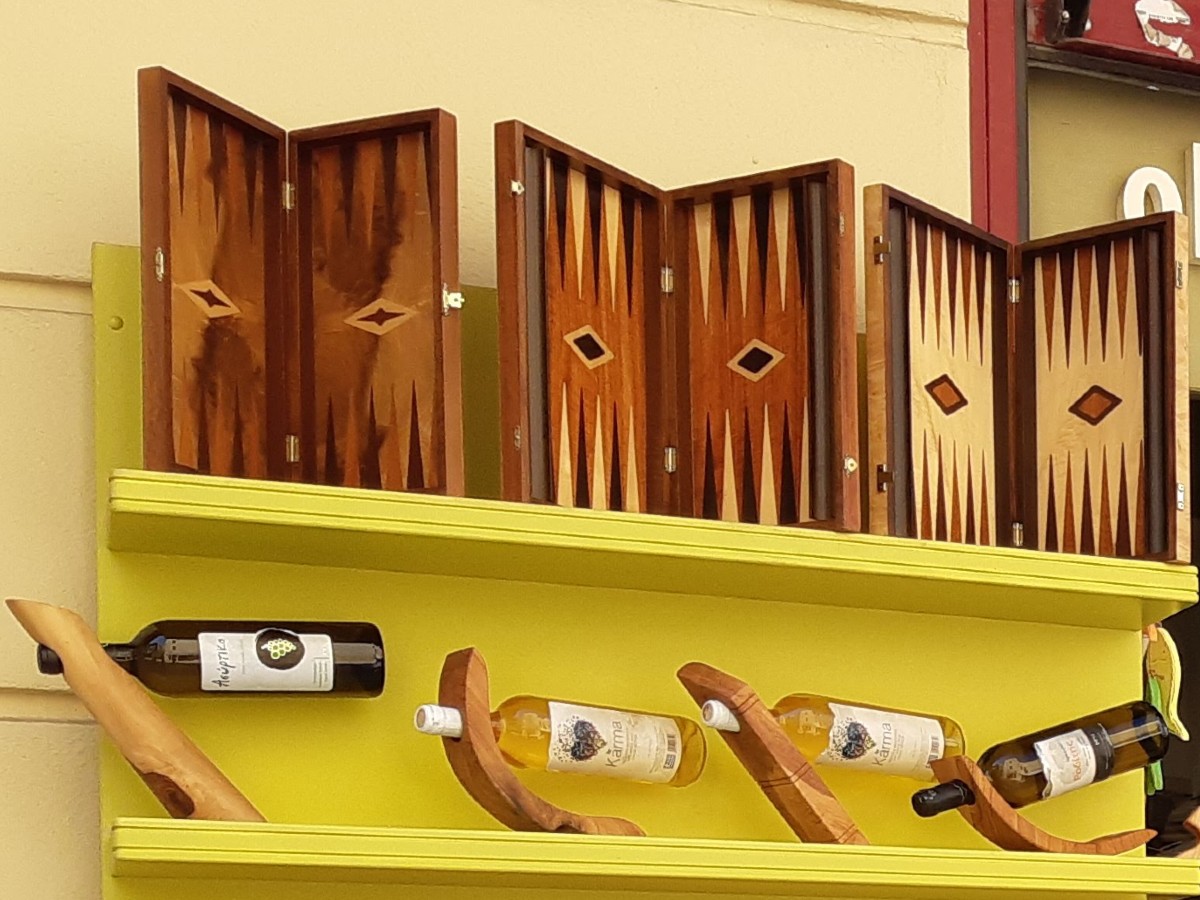
Today, backgammon, or tavli as we call it, remains popular not only in Greece, but also in many nearby countries. It’s a rather addictive game, and requires skill combined with some luck.
Backgammon boards are easily available around Monastiraki market in Athens. The standard size is rather bulky, but could even fit in your hand luggage.
Depending on quality, a backgammon board price ranges widely. You can spend anywhere from about 10-15 euro, to several hundreds of euro for backgammon boards made out of olive wood or leather.
12. Worry beads
Worry beads, or komboloi, is made out of an odd number of beads around a piece of string. It is a small Greek souvenir, which makes it easy to bring back home.
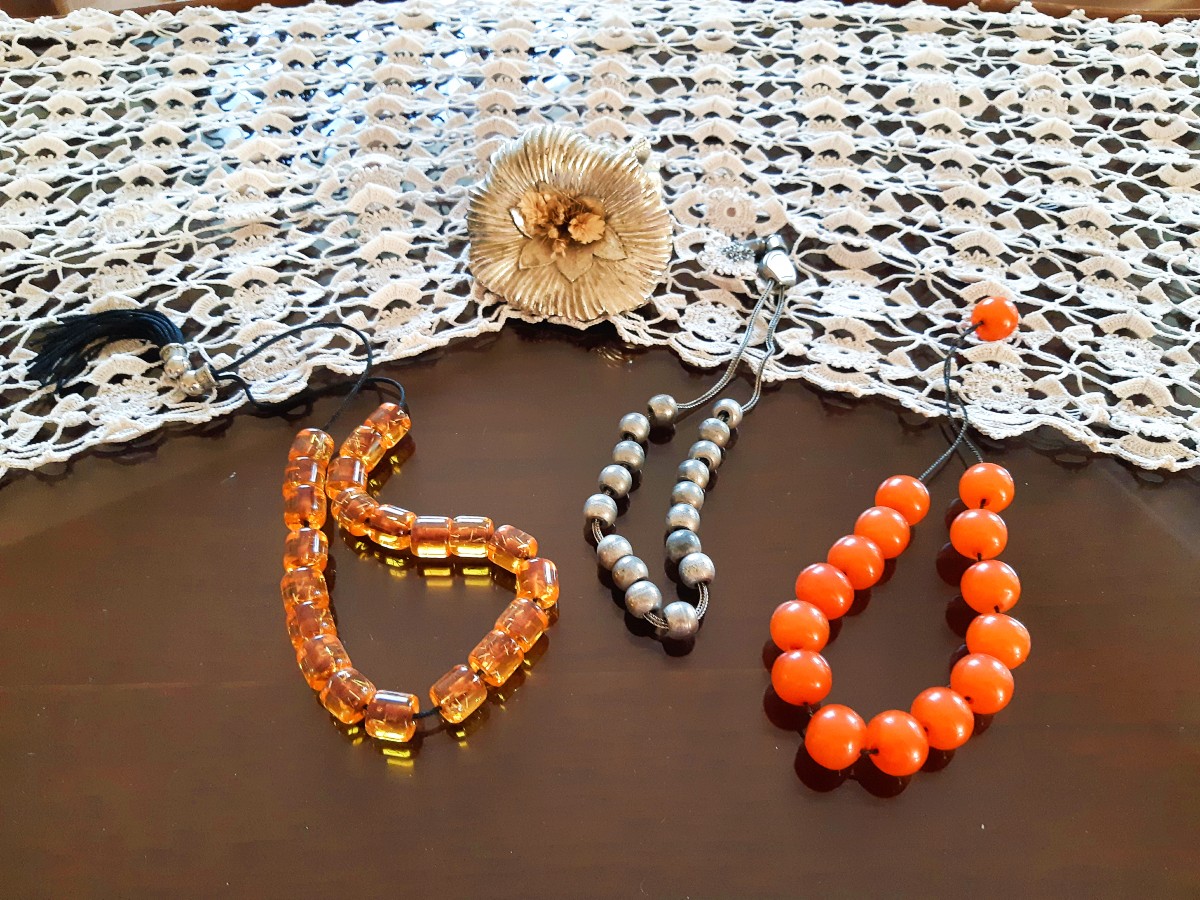
Even 100, or 50 years ago, it was rather common for older men to play with a komboloi. Today, you will rarely see people holding on to them – they are used mainly as decoration in Greek houses.
Worry beads can be made out of bakelite, resin, amber, ebony, bone, coral, olive wood, and many more natural materials.
You can find cheap komboloi at most souvenir stores. If you are looking for something more valuable, check out Kombologadiko store in Athens and Mykonos.
13. Greek jewelry
A great souvenir from Greece is jewelry, and you will find a fantastic selection. From inexpensive wristbands, to silver rings and pendants to top quality gold jewellery, Greece has got you covered.
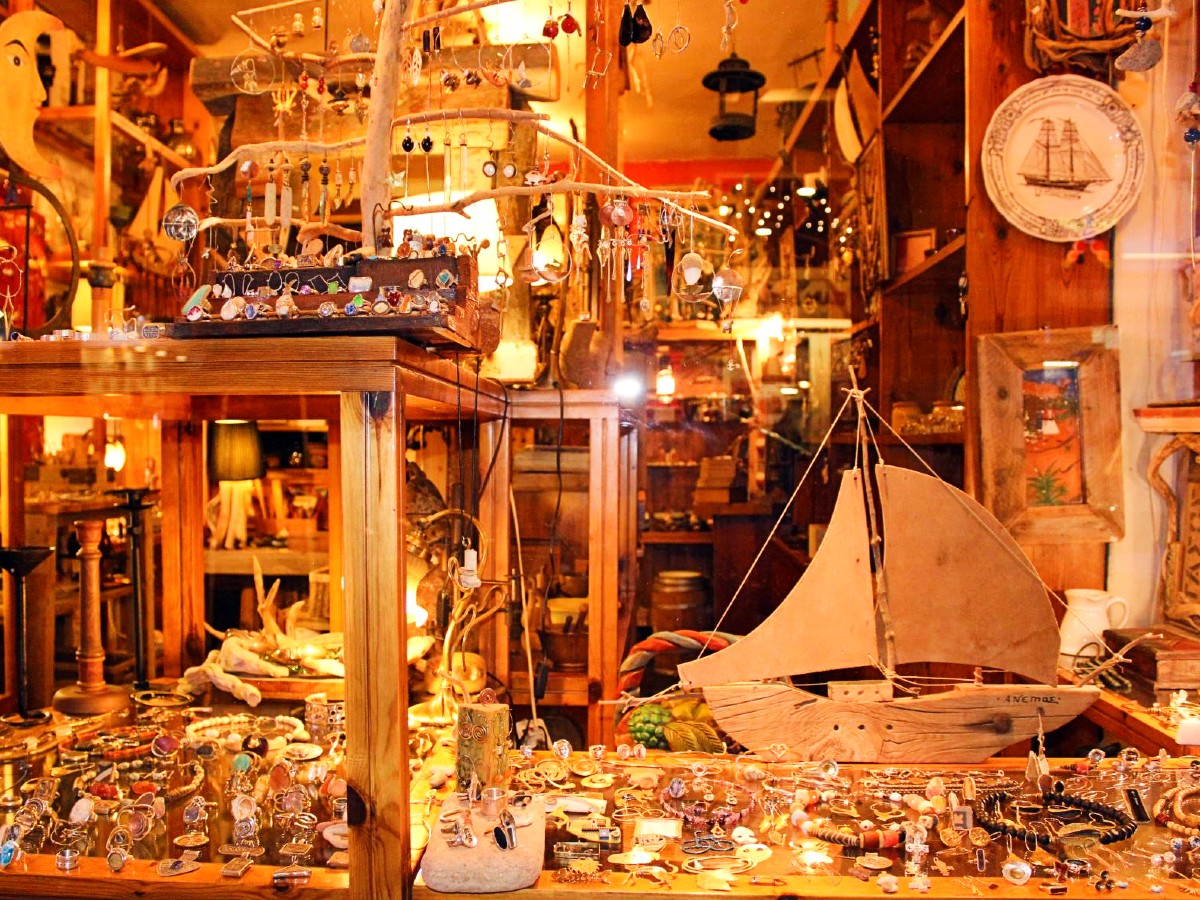
If you are interested in buying affordable, original designs in Athens, wander around Plaka, Thisseio and Monastiraki flea market. You will find dozens of stalls where local artists display their creations.
Two local jewelry stores I personally love are Hyperion and AlexisP, both in Plaka. Their designs are unique and totally affordable, and they are also really nice people!
For more luxurious jewelry, check out some of the long-established brands, like Zolotas, Lalaounis and Vildiridi. I also warmly recommend Skaras Jewels, for their lovely designs and incredible professionalism!
14. A charm to keep away the evil eye in Greek culture
The evil eye is a superstitious belief in curse. It is supposed to be caused by someone looking at the affected person, and can be given inadvertently.
The concept of the evil eye has been around for thousands of years. You may have seen drawings of eyes on Ancient Greek pottery, a symbol of apotropaic magic. Evil eye bracelets are actually pretty popular in Greece!

Today, the evil eye is common around countries of the Mediterranean and the Middle East, as well as in Africa and Asia, and it is similar to the Egyptian Eye of Horus. Even the Greek Orthodox church accepts the existence of this type of curse.
To protect someone from the evil spirits and bad luck, it is customary to give them a special talisman. We call it “matohantro“, which comes from the words we use in Greece for eye (mati) and bead (hantra).
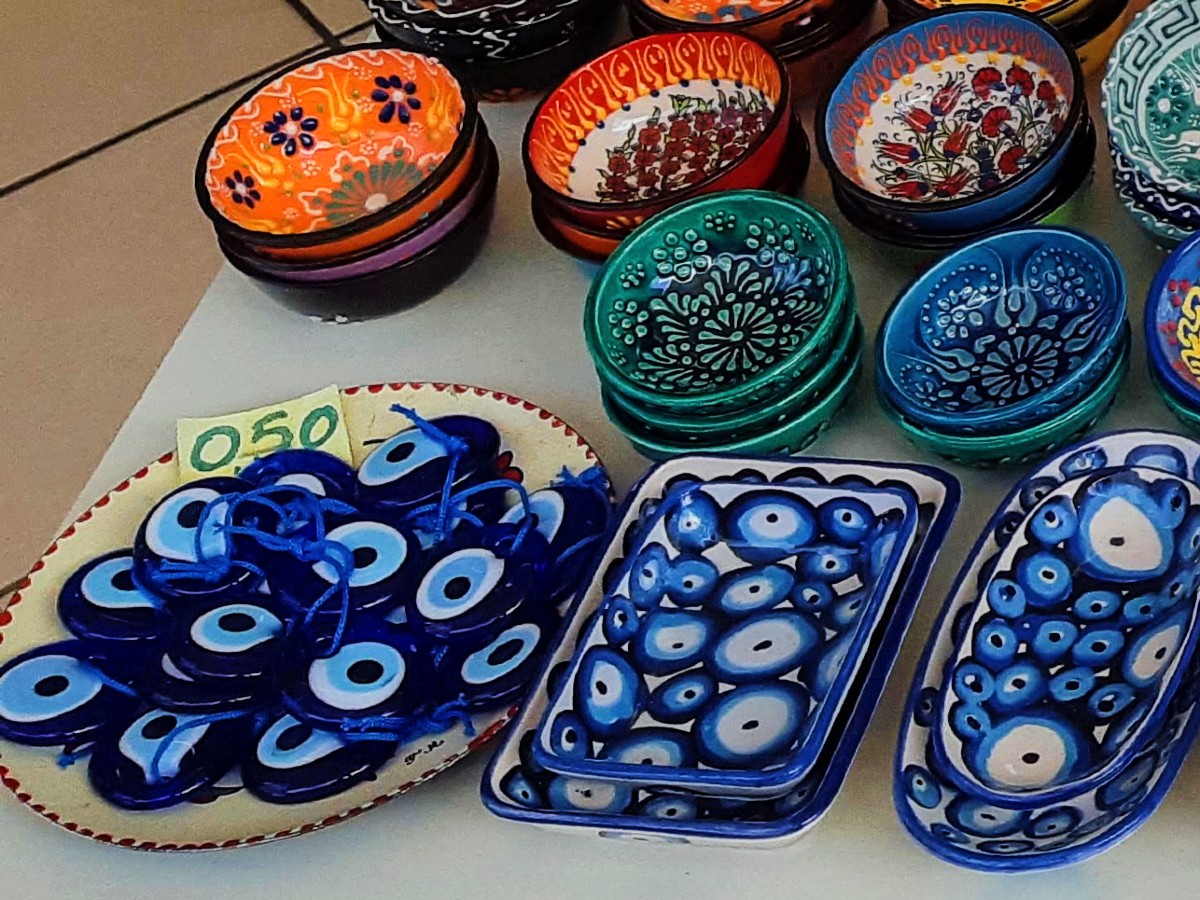
These lucky charms resemble the shape of an eye, and they are usually blue. These days, there are many objects with this pattern, including tea towels, cushions, bags and cups.
You can find them in most souvenir stores all around Greece. For something slightly more subtle, you can also buy jewelry with eye-shaped beads.
I was surprised to see that there’s a wide selection of evil eye beads, bracelets and T-shirts on Amazon! Have a look.
If you want to read further into this, here is some exciting information about the evil eye and its origins.
15. Handmade ceramics
Pottery has always been a big thing in Greece. Ancient Greek ceramics are exhibited in many of the best museums in Athens and all around the world.
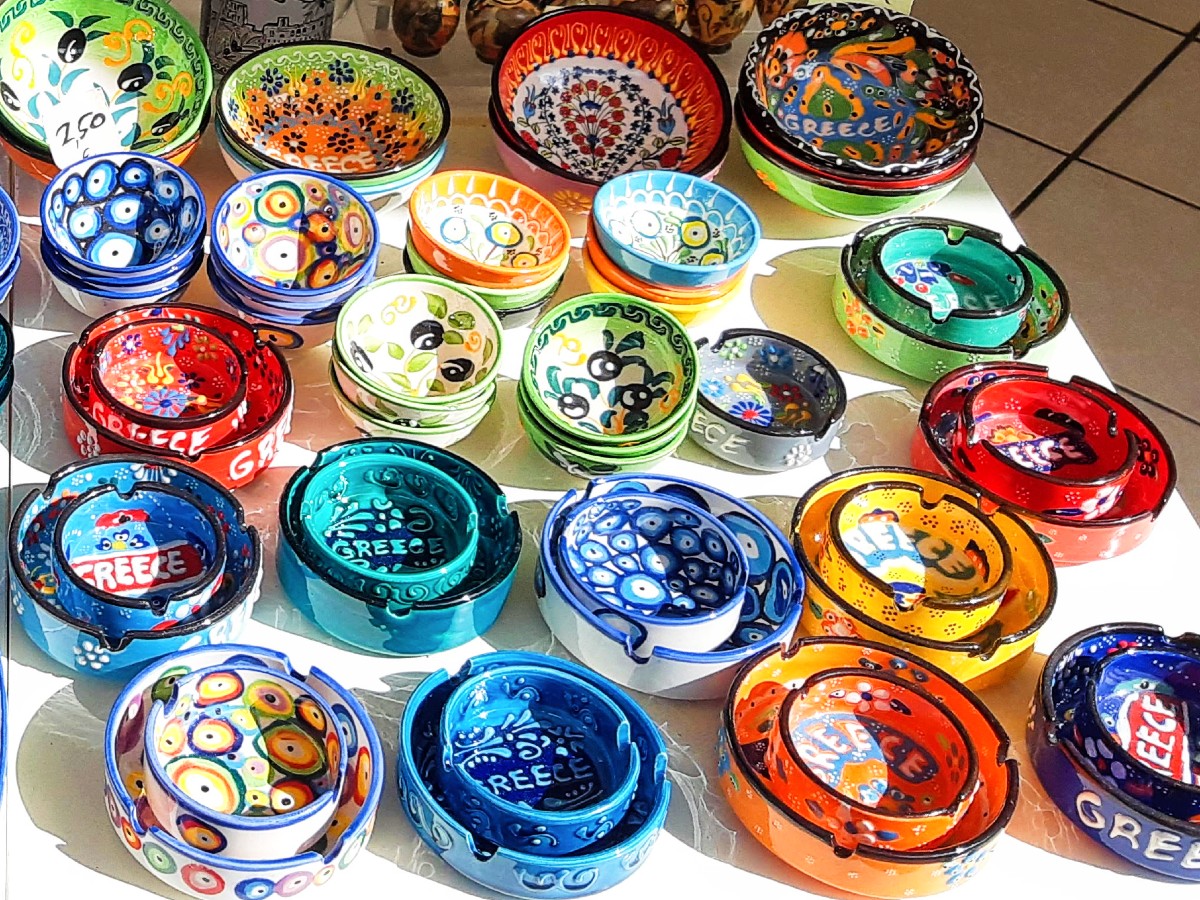
Anywhere you go in Greece, you will find ceramics. Apart from mass-produced, colorful bowls and cups, you will also find beautiful hand painted ceramics created by local artists.
Some of the islands, like Sifnos, have a long-standing pottery tradition. Alternatively, you can get ceramics in the flea markets in Athens and in some museum gift shops. They are great – though slightly tricky to travel with – souvenirs of Greece.
16. Deck of cards with scenes from Greek mythology
A really fun and unique Greek souvenir is a deck of cards with scenes influenced by the Greek mythology.
They are typically decorated with some of the 12 Olympian gods, prominent heroes like Heracles or Prometheus, and other popular figures that you’d normally see on pottery items.
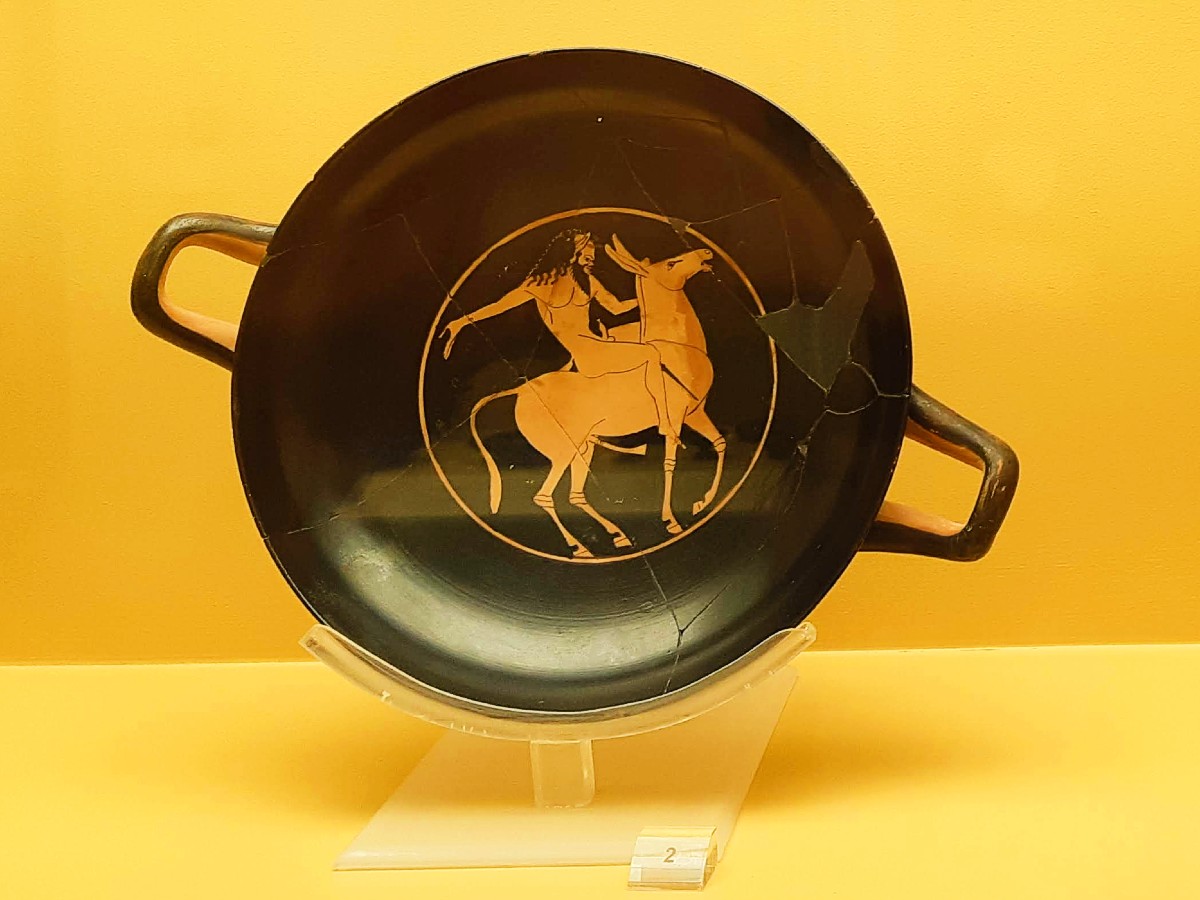
Now before you buy those for your young nephews or grandma’s friends, check them carefully. The cards often depict erotic scenes, which are probably not what you want to gift to everyone.
You will find these decks of cards everywhere around Monastiraki and Plaka.
17. A phallically shaped bottle-opener
If the decks of cards are not funny enough for your close friends, there’s another naughty Greek souvenir you can get for them. And this is none other than a wooden, phallically-shaped bottle opener.

Whether these are popular souvenirs or not, I am not sure. But you can easily find them at the flea markets and tourist shops. Now, whether you want to keep them in your hand luggage when you are flying home, is another matter 🙂
Fun fact: They come in various colours and sizes, so you can choose the one that you like best.
A bit of trivia: In Ancient Greece, the phallus symbolized fertility and prosperity. Apart from that, was used as a protection symbol from evil powers. It protected not only people, but also buildings and whole cities.
Now you know why you can often find phallic symbols in museums, and also on the walls at various archaeological sites, like Ancient Delos.
18. A Greek bouzouki or other musical instrument
If you have musician friends, a great idea for a gift is a Greek musical instrument. The most famous is the bouzouki, a string instrument that looks like a lute or a mandolin.
The Greek bouzouki hails from Asia Minor. It became popular in Greece during the rise of the forbidden rebetika music, in the first half of the 20th century.

Counting the neck, a normal bouzouki measures around one metre long. If it’s hard to carry, you can look out for other traditional instruments. A tzouras or a baglamas look like a small-scale bouzouki and will be easier to bring back home.
There are a few stores around Plaka and Monastiraki specializing in making instruments. Alternatively, check out musical instrument stores like Nakas, Stollas and Adagio.
Or you can talk to these guys, who are a lot more than just a bouzouki shop.
19. CDs with Greek music
Some people would argue that CDs are almost useless in the days of YouTube and Spotify. However, you can’t always find the songs you are looking for, and a CD is always a great gift for every music lover out there.
You will easily find CDs of some of our most prominent musicians and composers in all music stores in Athens.
Just a few examples you could research before your trip: Hatzidakis, Theodorakis, Savvopoulos, Agelakas, Delivorias, Dalaras, Mitsias, Tournas, Tsitsanis, Farantouri, Galani, Protopsalti, Arvanitaki, Vissi, Alexiou.
Let me know if you have any other favourites in the comments!
20. Natural soaps and cosmetics
Remember how olive oil, honey and mastiha have been used for medicinal purposes since forever? It shouldn’t come as a surprise that they are also used in natural soaps and cosmetics.
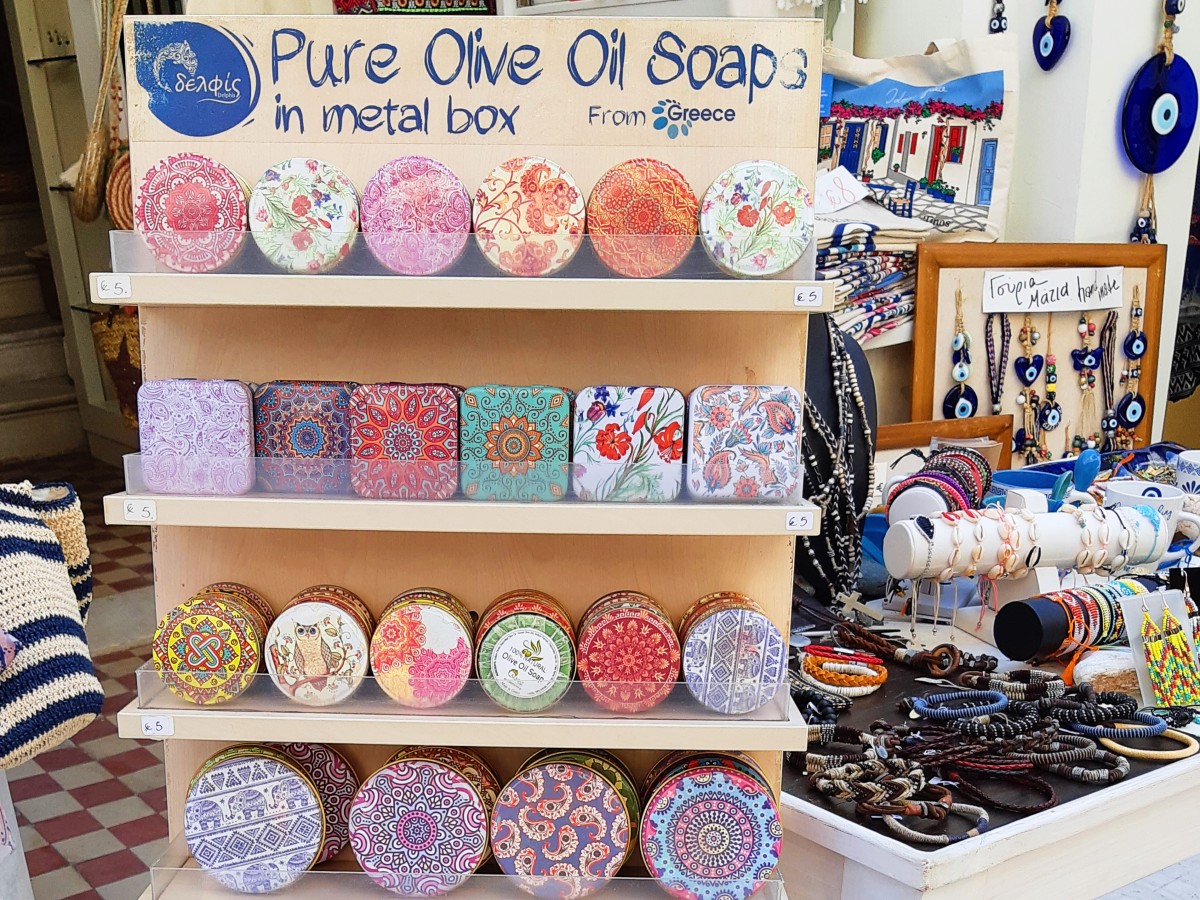
If you are familiar with argan oil, you could say that olive oil is its Greek version. When in Greece, you will find plenty of olive oil beauty products, such as hand creams, facial moisturizers and hair conditioners.
Other widely used ingredients include yoghurt, chestnut, propolis, pine and saffron.
Two brands you can look out for are Korres and Apivita. You will find many more brands in most tourist stores, cosmetics stores like Hondos Center, and most pharmacies.
21. Football or basketball T-shirts
Football and basketball T-shirts are always a great gift for children and teenagers (and not only). If his popularity in Greece is anything to go by, a shirt with Giannis Antetokounmpo’s name is all the rage right now.
For football T-shirts, check out the official stores of Olympiakos, Panathinaikos and AEK. You can also find sports shirts around Monastiraki and Plaka.
22. Religious icons
Religious icons will definitely appeal to any Greek Orthodox friends and family. Iconography is still a pretty popular profession over here.
![]()
This form of art goes back to the Byzantine years. The figures, which are carved on a wooden frame, are austere and colorful. Bright colours like red, green silver and gold are widely used.
You can find great quality icons in stores in central Athens. Religious destinations, such as the Meteora monasteries or the fantastic Greek island of Tinos, also offer a wide variety of icons.
23. Greek carpets and rugs
Noone can deny that synthetic materials have taken over our world. Today, it’s a lot easier to buy a carpet made out of polyester, than look for a woolen or silk one.
If, however, you are looking for traditional carpets and rugs, you will find many different types in Greece. The traditional, heavy woolen flokati rugs, or the thick, woolen kilimia will add character to your living room or bedroom.
The Loom, on Adrianou street Plaka, is a good place to start your search for Greek and international rugs and other homeware.
24. A replica of an ancient Greek statue
A replica of an ancient Greek statue is a gift that will appeal to many people. You can find statuettes made out of different materials, including clay, resin, alabaster or bronze.

Popular figures include Aphrodite of Milos, Nike of Samothrace, goddess Athina and god Apollo.
I also find the Cycladic figurines very pretty. These colourful versions I have seen in Santorini and Naxos are quite cool.
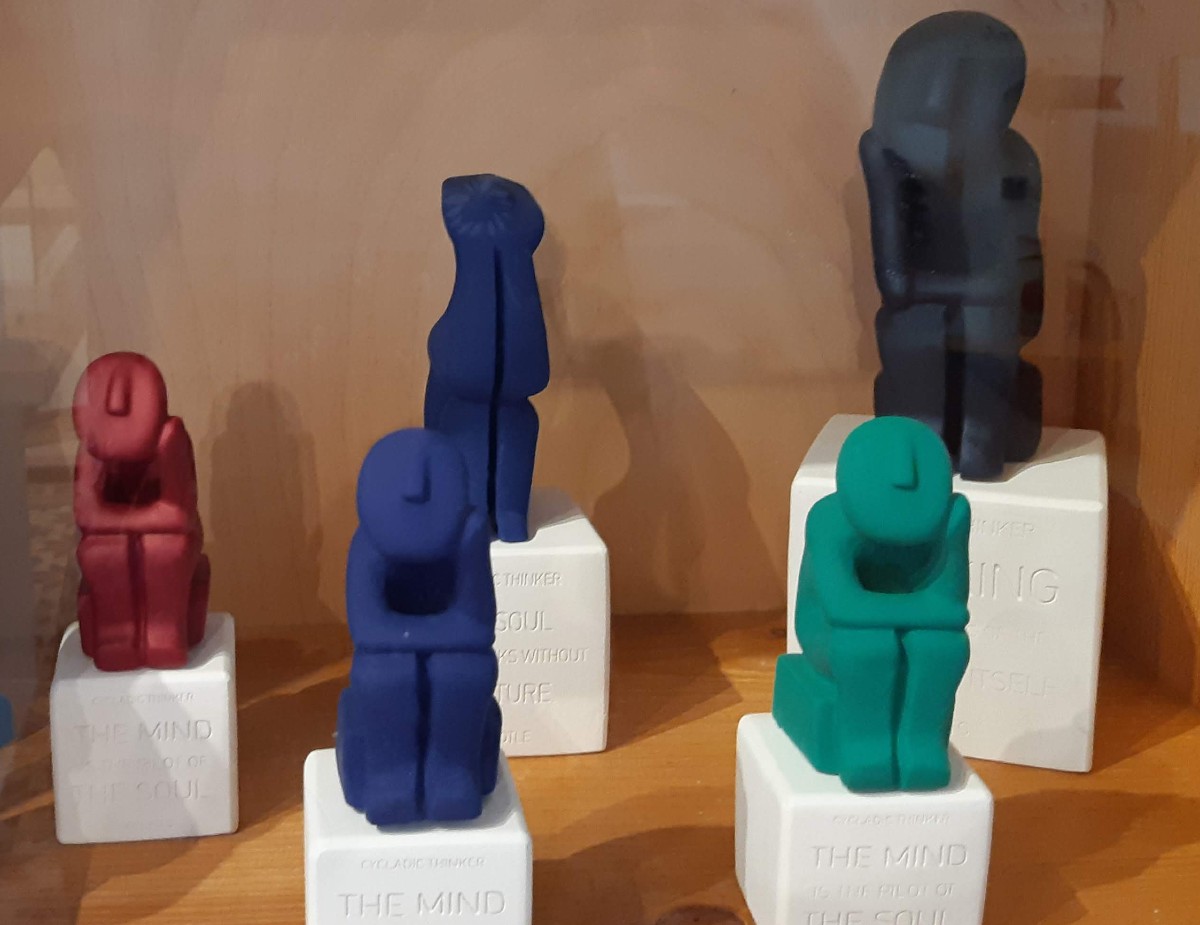
While you can find replicas in most souvenir shops, I also suggest you check out the museum gift shops, starting with the Museum of Cycladic Art in Athens.
25. Ancient Greek helmet and full body armour
If the statue replicas don’t quite cut it, no worries. Hardcore Ancient Greece fans can find a lot more than that.

As an example, you could consider bringing back an ancient Greek helmet. While they probably wouldn’t be effective in case of battle, they would suit a living room with an Ancient Greece theme.
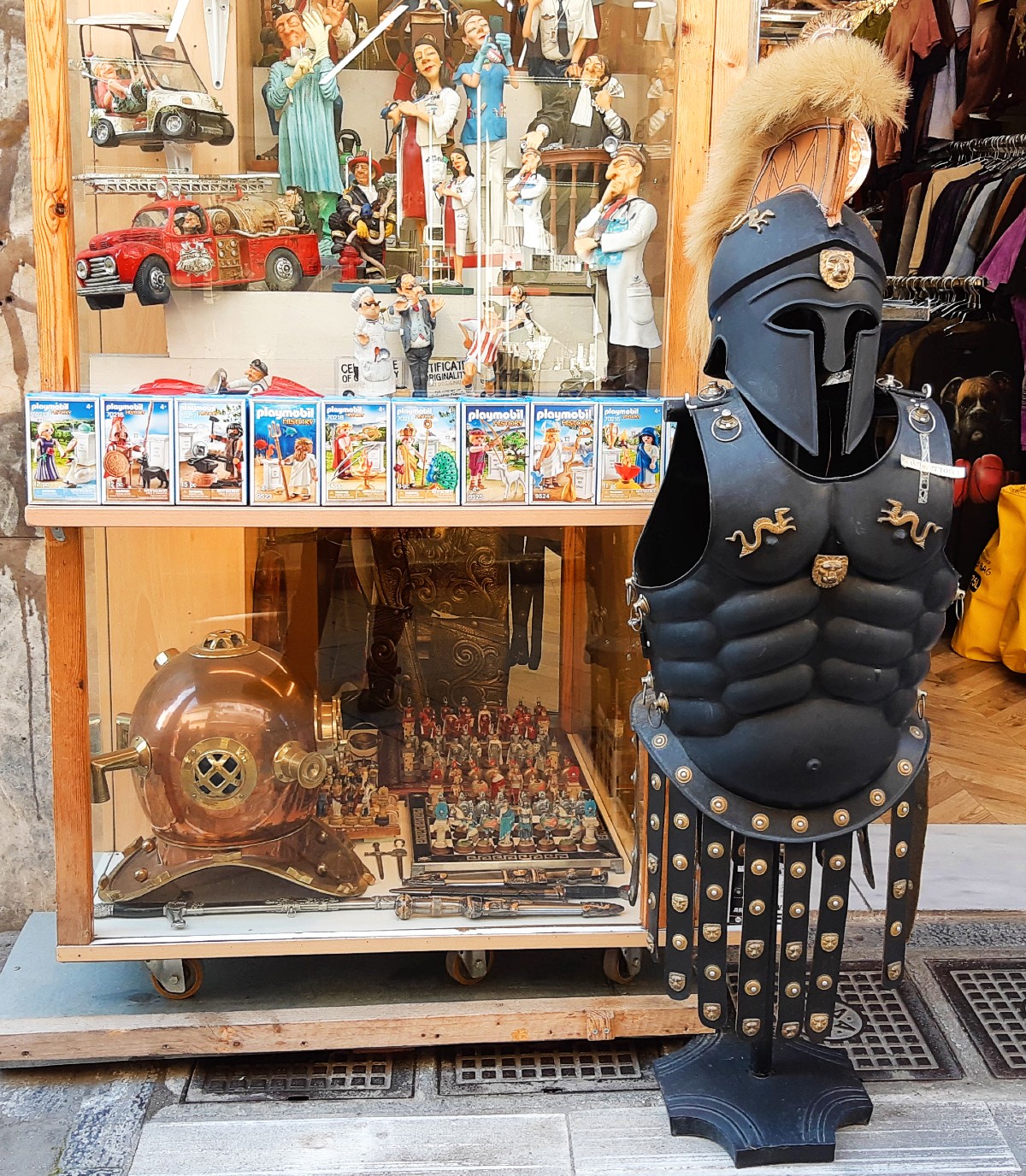
And if the helmet still isn’t enough, why not go for the ultimate souvenir from Greece, a full body armour!
26. An ancient Greek Playmobil!
I would have never thought that an ancient Greek Playmobil exists, until I saw it somewhere in Plaka. This is probably one of the best souvenirs in Greece for kids.

Playmobil figures of Ancient Greeks are part of the “Playmobil History” series. You will find gods and heroes like Zeus, Hercules, Achilles, Patroclus, Ulysses, Hera, Athena, Artemis and many more.
There’s even the Palace on Mt Olympus! And I’m sure that, if you look hard enough, you’ll find Playmobil figurines participating in the Ancient Olympic Games!
FAQs about Greece souvenirs
Here are a few questions people often ask:
What is Greece famous for souvenirs?
Some of the most famous Greek souvenirs are ouzo, leather sandals, worry beads, and anything related to olive trees.
What should I buy while in Greece?
It depends on what you like. If you can bring food items back, I recommend buying some Greek honey and feta cheese. You could also consider getting some leather sandals, Greek statue replicas, or traditional ceramics.
What are the most popular souvenirs?
I have often seen visitors buy olives, jewelry, backgammon sets, leather sandals and the Greek charm to protect you from bad luck.
What type of jewelry is Greece known for?
Silver jewelry is very popular in Greece, and you can easily find very intricate designs. These days, you can also buy Greek jewelry made out of many different materials – metals, gemstones, wood, glass, cardboard, and different types of resins.
What Greece souvenirs to buy for kids?
My favourite souvenir for kids would be either Playmobil figurines, or books based on mythology. You can also find games with a Greek theme – just avoid the funky decks of cards.
More information about shopping in Greece
For more information about souvenir shopping in Athens, check out my article on what to do in Athens on a Sunday. I have included information on a few non-touristy flea markets in Athens. Exploring them is always great fun!
Also, check out this article on shopping in Athens.
If you only have a day or two in Athens, you can take a walking tour of the Acropolis and Plaka, where you will have the opportunity to ask directly for the best souvenir shops.
Also read:
- Useful words and phrases in Greek
- Interesting facts about the Greek flag
- How to take the Athens airport metro
- Little Kook in Athens
- The best SIM card for Greece
- How to get around Milos
- Plaka town in Milos – not to be confused with Plaka in Athens!

Hi! I’m Vanessa from Athens. I hope that this article has given you a good introduction on souvenirs you can buy in Greece. I’d be very curious to know what are your favourite presents from Greece. Follow me on my social media:
- Facebook page and very active Facebook group
- Amazon
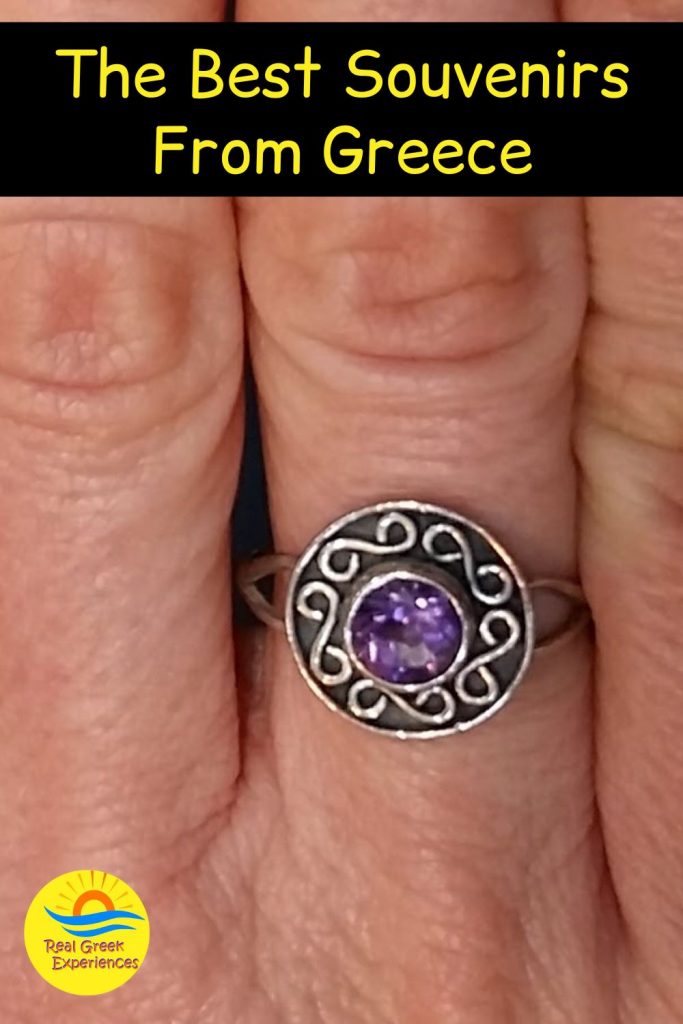

I enjoyed reading what you wrote. I will be coming to Athen’s in June for a 7 day cruise I wanted to come 3 days ahead to sitesee but with the Covid testing I couldn’t find a place to take the test
Hi! You can take a rapid test at most pharmacies in Greece – here’s an article that might help. By June, hopefully these restrictions will be lifted – you can have a look at this article a few days before you arrive, as I update it every week. Enjoy your holiday!
Thank you for writing this article. It helped me 🙂
I’m very glad to hear this!! Enjoy your time!
Great article !! Lots of stuff I never would of thought about buying.
Thank you!! 🙂
Love reading your articles. I collect Nativities. Are there some unique ones for Greece? We are coming to visit in February.
Hi – could you please email me at realgreekexperiences@gmail.com with some photos of nativities you already have so I can get an idea? Thanks!
Please note a warning for US travelers buying food or any agricultural products to take back to the US: The Customs and Border Protection agents work in coordination with the US Department of Agriculture to STOP all agricultural imports into the US! No herbs, honey, cheeses, and other fresh products are allowed into the country. The agents use K-9, trained dogs, to locate such products in passengers luggage.
For sure, every traveller needs to know their country’s regulations regarding food and other goods. I’ve highlighted this in the article.
This is simply not true. All of the products you listed ARE most certainly allowed into the United States. We bring honey, feta cheese, fresh mountain tea, and it is all absolutely permitted per the US Customs and Border Patrol website. Of course it is important for every traveler to do their research, as certain rules apply (I.e. cheeses with meat in them; such as cheeses with pieces of bacon, are not allowed).
Thanks for your comment Holly – this will be useful to other people living in the US! Do these regulations change from time to time?
Do you have a complete site map anywhere online? I keep discovering more and more wonderful pages and topics just at random (while in the middle of reading another lovely post) and it makes me wonder what else I am missing! I’d love to see a table of contents! Thanks for compiling all this great info – your site is a gold mine!
Hi Molly – I’m afraid it’s not user-friendly but here it is! https://realgreekexperiences.com/post-sitemap.xml
Are your streets and beaches safe to walk alone. How is crime when visiting Athens and surrounding areas?
I do find them safe overall, perhaps with the exception of a few neighbourhoods in Athens. Be careful in crowded areas as well as the metro, pickpockets do operate and they target tourists.
Hi Vanessa,
I am a buyer for cruise ships and I’m looking for local vendors to buy local souvenirs from. I really like your recommendations, and I need contacts for sandals, bottle openers, soaps, hats, dresses, souvenirs, ornaments etc. Can you please help? Thank you!
Feel free to email me at vanessa@realgreekexperiences.com and we could work something out. Thanks!